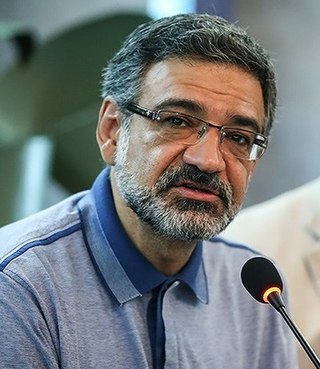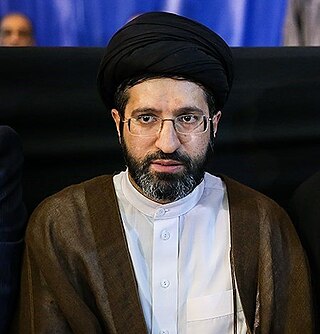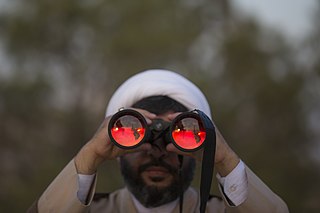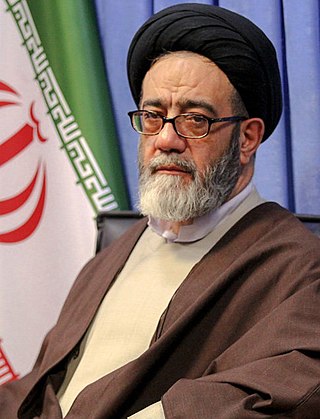| Authors | Ali Khamenei |
|---|---|
| Original title | Ghina' (غناء) |
| Language | Persian |
| Publication place | Iran [1] [2] [3] |
| Pages | 562 |
Ghena (book), also known as "the book of Ghina' and Moosiqi (music)", [4] [5] is a Persian Feqhi book by Iran's supreme leader, Seyyed Ali Khamenei. [6] This religious book [7] [8] which is also known as "Darsnameh Ghina'-and-Moosiqi" (i.e. textbook of Qena and Music), [9] includes the text of 76 sessions from the Fiqh sessions of haram (illegal) gains of Seyyed Ali Khamenei in regards to the subject of Ghina' and music. [10]
Ghena or Ghināʾ (in Arabic: الغناء), is attributed to the voice of a human being produced in an undulating pattern in order to create the effect of rapture which is appropriate for gatherings of merrymaking and sin. This is haram (forbidden Islamically) to engage in this kind of singing; in addition to listen to it. [11]
The Research-Cultural Institute of "Enghelab-e-Eslami" (the Islamic Revolution institute) relating to "the Office for the Preservation and Publication of the Works of Seyyed Ali Khamenei", has published the textbook of Ghena which is including 76 sessions (since 2008-2009). The goal of this publication is to perceive Seyyed-Ali Khamenei's viewpoint and his Feqhi manner on the mentioned subject -- of Ghina'. [12] On the other hand, Arabic article of Khamenei in this field has been published by the institute (of Enghelab-e-Eslami) in the periodical of "Feqhe-Ahlulbayt". [10]
Seyyed Mohammad Jafar Moravej whose complete name/fame is "Seyyed Muhammad Jafar Jazaeri Moravej al-Shariah", was an Iranian Shia scholar who was born in 1910 and died in 1999, in a religious family in Shushtar. His father was Seyyed Muhammad Ali Moravej, and he is among the descendants of Seyyed Nematollah Jazayeri who was a prominent Shia scholar. This Shia scholar is commonly known as "Ayatollah Seyyed Muhammad Jafar Moravej".

Second Phase of the Revolution or "Second Step of the Revolution" is a statement that was issued by the supreme leader of Iran, Sayyid Ali Khamenei to the country, particularly to the youth, and was published in February 2019, on the occasion of the fortieth anniversary of the victory of the Iranian Revolution.

Sayyid Abdul-Nabi Mousavi Fard is an Iranian Twelver Shi'a cleric, who has been recently appointed as the representative of Wali-Faqih in Khuzestan province and likewise as the Imam of Friday Prayer of Ahwaz by the order of Sayyid Ali Khamenei, the supreme leader of Iran, on 30 April 2019.

Disavowal of Polytheists in Hajj is an Islamic religious/political tradition which is yearly performed at the time of Hajj. Disavowal of polytheists is a Qur'anic term or tradition which is applied to "disgust to polytheists and the enemies of Allah/His apostle"; it likewise means: "Announcement of Bara'ah (disgust/aversion) from all Taghuts and arrogance powers".

The Khamenei family or Khamenei dynasty is among the Iranian Azeri Sayyid families who claim to be descendants of the fourth Imam of Shia Islam, Ali ibn Husayn Zayn al-Abidin — according to the "Khamenei family tree". Their dwelling place(s) were/are in Azerbaijan (Iran), Najaf, Tafresh, etc.

Sharh-e Esm is the biography of the supreme leader of Iran, Ali Khamenei. The book is written by Hedayatollah Behboudi, and has been translated in some other languages. It was published by the institute of Motaale’at wa Pazjuheshhayeh Siyasi.

Seyyed Mostafa Hosseini Khamenei is an Iranian Twelver Shia cleric and the oldest son of Iran's supreme leader, Ali Khamenei.

Hedayatollah Behboudi Kalhori, known as Hedayatollah Behboudi is an Iranian Shia writer and reporter. He was born in Tabriz, and left for Tehran in 1964. He graduated in the field of history from University of Tehran in 1992.

Ruhe-Tawhid, Nafye Obudiate GheireKhoda is the name of a book/article from Iran’s supreme leader, Seyyed Ali Khamenei, which was published in 1977 for the first time. This book was provided by him in response to a student's question and likewise to a query which was asked: “What is the practical role of believing in Tawhid, in the human life?”.

Seyyed Masoud Hosseini Khamenei, also known as "Seyyed Mohsen Khamenei", is an Iranian Twelver Shia cleric who is the third son of Iran’s supreme leader, Ali Khamenei; and is the brother of Mostafa, Mojtaba and Meitham. Khamenei also has the title of “Hujjatul-Islam”, and is the husband of Sadiq-Kharazi’s sister; likewise, he is the son-in-law of Seyyed Mohsen Kharazi. Seyyed Masoud is studying and teaching in the seminary of Qom; and is a member in Society of Seminary Teachers of Qom.

An Outline of Islamic Thought in the Quran is the name of a book/work of Iran's supreme leader, Ali Khamenei which was published in 1974 before the Iranian Revolution; and is a collection of (Khamenei's) copies, of his daily meetings (lectures) --at Imam Hassan Mosque in 1974-- plus an introduction which was written by him before the publication of the book.

Estehlal Headquarters is an organization and command post based in Iran, that deploys groups to monitor the sky and identify the crescent of the moon on the first night(s) of the Lunar month, as per the Islamic tradition of Estehlal. This is undertaken to mark the first day of each month in the lunar calendar. Estehlal Headquarters was established by the decree of Iran's supreme leader, Seyyed Ali Khamenei, to regulate the practice of Estehlal. The Center consists of 150 groups with 700 members.

Seyyed Mohammad Ali Ale-Hashem, also known as "Ayatollah Ale-Hashem" was an Iranian jurist and Twelver Shia cleric who was the representative of Vali-e-Faqih in the province of East Azerbaijan, and Imam of Friday Prayer in Tabriz.

Supreme Leader Representation in Universities (organization) (Persian: نهاد نمایندگی رهبری در دانشگاهها) is an Iranian religious/cultural institute which has been formed by the decree of Iran's supreme leader, Seyyed Ali Khamenei. It was organized based on the final decision of the Supreme-Council of the Cultural Revolution in March 1993 in order to establish a new institute to fulfill the scriptures of supreme-leader's goals and according to its determined scopes/duties, which do specified obligations based on its written statute.

This is a bibliography of the works of Ali Khamenei, Iran's supreme leader. Generally, his works can be classified into 4 periods of time:

Sayyid Mohammad Khamenei is an Iranian cleric and politician. He is the older brother of Ali Khamenei, the current Supreme Leader of Iran, and Hadi Khamenei. Currently, he is the president of Iranology Foundation, and Sadra Islamic Wisdom Foundation, he is a professor at Allameh Tabataba'i University, School of International Relations and Al-Zahra University. He was also one of the compilers of the Constitution of the Islamic Republic of Iran and a member for the Islamic Consultative Assembly representing Mashhad.
Nuclear Fatwa Under International Law is a Juridical book written by Jaber Seyvanizad, and was published by the American publication "Supreme Century" in 2017. The chief subject of "Nuclear Fatwa Under International Law" book is concerning "Determining the legal status and dimensions of the Supreme Leader's nuclear-fatwa" through international-law. Based on the fatwa of the Supreme Leader of the Islamic Republic of Iran Seyyed Ali Khamenei, the utilization of nuclear weapons is forbidden.

Seyed Ayatollah Karamatollah Malek-Hosseini was an Iranian Ayatollah and member of the Second, Third and Fourth terms of the Assembly of Experts.
Moon sighting refers to the act of observing a new crescent moon and is one of the ways to determine the beginning of a lunar month in religion. On the Islamic calendar, a month begins with the sighting of the new crescent Moon. That makes astronomy a key part of Islamic events and festivals, including Ramadan and Eid al-Fitr.